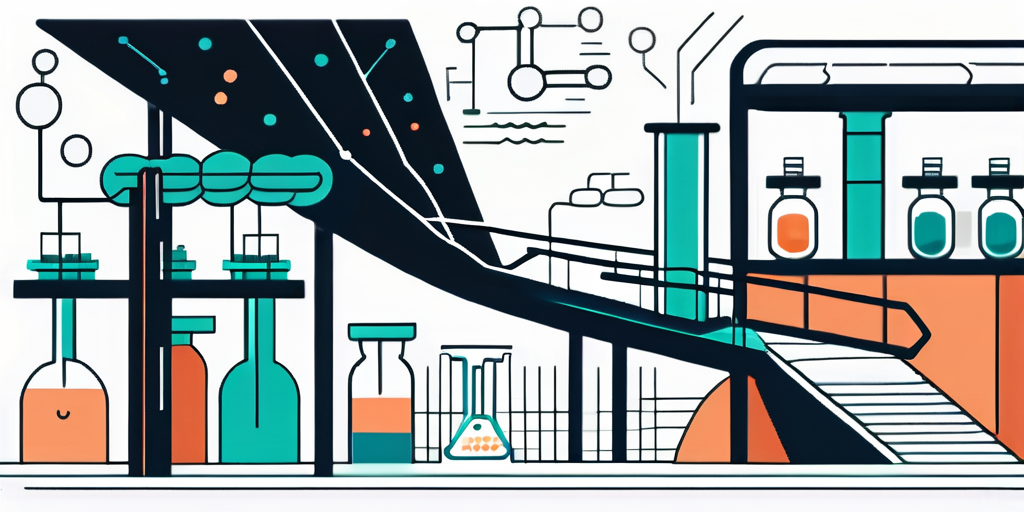In recent years, there has been a significant shift in the pharmaceutical industry towards collaborations between big pharma companies and biotech firms. These partnerships have proven to be beneficial for both parties, as they combine the resources and expertise of big pharma with the innovative and agile nature of biotech. This article explores the various aspects of such collaborations, including their benefits, evolution, challenges, impact on drug discovery and innovation, as well as future trends in the big pharma and biotech landscape.
Collaborations between big pharma and biotech bring together the best of both worlds. Big pharma companies often have extensive financial resources, global reach, and regulatory expertise. These companies have established themselves as key players in the pharmaceutical industry, with a strong presence in multiple markets around the world. Their financial resources allow them to invest heavily in research and development, ensuring the continuous advancement of medical science.
On the other hand, biotech firms are known for their innovative research, specialized knowledge in niche areas, and ability to quickly adapt to changing market needs. These companies are often founded by scientists and researchers who are passionate about pushing the boundaries of medical knowledge. They focus on developing cutting-edge technologies and therapies that address unmet medical needs. Biotech firms are agile and nimble, able to pivot their strategies and approaches as new discoveries emerge.
By combining these strengths, collaborations enable big pharma companies to tap into the creativity and fast-paced nature of biotech, while biotech firms gain access to the financial backing, distribution networks, and operational scale of big pharma. This partnership allows for the acceleration of drug discovery and development processes, leading to the potential for faster market access and improved patient outcomes.
One of the key advantages of big pharma and biotech partnerships is the ability to leverage each other’s expertise. Big pharma companies have years of experience navigating complex regulatory frameworks and ensuring compliance with stringent safety and efficacy standards. They have established relationships with regulatory authorities, which can help streamline the approval process for new drugs.
On the other hand, biotech firms bring a fresh perspective and innovative approaches to drug discovery. Their specialized knowledge in niche areas allows them to identify novel targets and develop therapies that target specific patient populations. By collaborating with big pharma, biotech firms can benefit from the industry knowledge and commercialization expertise of their partners, ensuring that their breakthrough discoveries reach the market and have a meaningful impact on patient care.
Furthermore, big pharma and biotech partnerships can also lead to increased investment in research and development. The financial resources of big pharma companies can help biotech firms accelerate their research programs and bring their discoveries to clinical trials. This influx of funding can also support the expansion of research facilities and the recruitment of top talent, further enhancing the capabilities of biotech firms.
In conclusion, the collaboration between big pharma and biotech brings together complementary strengths and expertise. By combining the financial resources, global reach, regulatory expertise of big pharma with the innovative research, specialized knowledge, and agility of biotech firms, these partnerships have the potential to revolutionize the pharmaceutical industry. Together, they can accelerate the drug discovery and development processes, leading to faster market access and improved patient outcomes.
Collaborations between big pharma and biotech have come a long way since their inception. In the early days, such collaborations were often limited to licensing agreements or small-scale research partnerships. However, with the increasing complexity of drug development and the need for innovative therapies, these collaborations have evolved into more strategic alliances.

Today, we see joint ventures, co-development agreements, and even mergers and acquisitions between big pharma and biotech firms. These partnerships allow for the sharing of risks and rewards, as well as the pooling of resources and capabilities. Together, big pharma and biotech can tackle the challenges of developing novel therapeutics and addressing unmet medical needs.
One example of a successful collaboration in the pharmaceutical industry is the partnership between Pfizer and BioNTech. In 2020, these two companies joined forces to develop and manufacture a COVID-19 vaccine. This collaboration brought together Pfizer’s expertise in vaccine development and BioNTech’s innovative mRNA technology.
The Pfizer-BioNTech collaboration was a game-changer in the fight against the pandemic. The vaccine they developed, known as Comirnaty, has been proven to be highly effective in preventing COVID-19 and has been authorized for emergency use in many countries around the world.
Another notable collaboration in the pharmaceutical industry is the partnership between AstraZeneca and Oxford University. Together, they developed a COVID-19 vaccine that has been widely distributed globally. This collaboration showcased the power of academic-industry partnerships in accelerating the development and distribution of life-saving vaccines.
Collaborations in the pharmaceutical industry not only focus on vaccine development but also extend to other areas of research and development. For example, many big pharma companies collaborate with biotech firms to explore new drug targets and develop innovative therapies for various diseases.
These collaborations often involve sharing of scientific knowledge, research data, and intellectual property. By combining their expertise and resources, big pharma and biotech can expedite the drug discovery process and bring new treatments to patients faster.
Furthermore, collaborations in the pharmaceutical industry can also extend beyond the realm of drug development. For instance, companies may collaborate to improve manufacturing processes, enhance supply chain efficiency, or develop new technologies for drug delivery.
In conclusion, the evolution of collaboration in the pharmaceutical industry has transformed the way big pharma and biotech work together. From simple licensing agreements to strategic alliances, these collaborations have enabled the development of groundbreaking therapies and vaccines. By leveraging each other’s strengths and resources, big pharma and biotech can continue to drive innovation and address unmet medical needs.
While collaborations between big pharma and biotech offer great potential, they also present unique challenges. One key challenge is the integration of different organizational cultures. Big pharma companies often have a more hierarchical structure and a slower decision-making process, whereas biotech firms value speed and agility.

Effective communication and alignment of goals are crucial in overcoming these cultural differences. It is essential to establish clear channels of communication, define roles and responsibilities, and foster a collaborative mindset. Furthermore, establishing trust and maintaining a transparent relationship are vital for the success of these partnerships.
Another challenge that arises in collaborative efforts between big pharma and biotech is the management of intellectual property. Both parties bring valuable assets to the table, including patents, proprietary technologies, and research data. Protecting and sharing these assets in a mutually beneficial way can be complex.
To address this challenge, it is important to establish a comprehensive intellectual property agreement at the outset of the collaboration. This agreement should outline the ownership, licensing, and usage rights of each party’s intellectual property. Additionally, establishing a framework for resolving disputes and ensuring confidentiality can help build trust and mitigate potential conflicts.
Furthermore, the difference in risk tolerance between big pharma and biotech can pose a challenge in collaborative efforts. Big pharma companies often have a more conservative approach to risk, while biotech firms are more comfortable taking calculated risks in pursuit of innovation.
Overcoming this challenge requires open and honest discussions about risk appetite and risk management strategies. It is important to establish a shared understanding of the potential risks involved in the collaboration and develop a risk mitigation plan that satisfies both parties. Regular monitoring and reassessment of risks throughout the collaboration can help ensure that any potential issues are addressed promptly.
Additionally, the size and scale of big pharma companies compared to biotech firms can create challenges in resource allocation. Big pharma companies often have more extensive resources, including financial capital, research facilities, and regulatory expertise. Biotech firms, on the other hand, may have limited resources and rely heavily on the collaboration for support.
To overcome this challenge, it is crucial to establish a fair and equitable resource allocation plan. This plan should consider the specific needs and capabilities of each party and ensure that resources are allocated in a way that maximizes the collaborative effort’s potential. Regular communication and transparency regarding resource availability and utilization can help prevent misunderstandings and foster a productive working relationship.
In conclusion, collaborative efforts between big pharma and biotech hold great promise for advancing medical innovation. However, they also come with their fair share of challenges. By addressing issues related to organizational culture, intellectual property management, risk tolerance, and resource allocation, these collaborations can thrive and lead to breakthrough discoveries that benefit patients worldwide.
Collaborations between big pharma and biotech have revolutionized the drug discovery and innovation landscape. These partnerships have allowed for the exploration of novel therapeutic approaches and the development of precision medicine. By leveraging the expertise of biotech firms in areas such as genomics, proteomics, and personalized medicine, big pharma can tailor treatments to individual patient needs.
Furthermore, these partnerships have facilitated the development of breakthrough therapies that address previously unmet medical needs. By combining big pharma’s resources in clinical trials and regulatory affairs with biotech’s cutting-edge research capabilities, innovative treatments are brought to market faster, benefiting patients worldwide.
Precision medicine is an area where collaborations between big pharma and biotech hold great promise. By leveraging biotech’s expertise in genomics, transcriptomics, and other molecular profiling technologies, big pharma can develop targeted therapies that are tailored to specific patient populations.

Partnerships in this field often involve sharing data and knowledge, as well as developing joint research programs. Collaborative efforts can lead to the identification of biomarkers that predict treatment response or guide patient selection, improving the success rate of clinical trials and reducing healthcare costs.
The future of collaborations between big pharma and biotech looks promising. As the pharmaceutical industry becomes more complex and competitive, companies are recognizing the importance of partnerships to drive innovation and growth.
We can expect to see an increased focus on early-stage collaborations, where big pharma companies invest in emerging biotech firms with promising technology platforms or drug candidates. This allows big pharma to access cutting-edge research while supporting the growth of biotech companies.
Furthermore, we may witness an increase in cross-industry collaborations, as big pharma companies seek to expand their reach beyond traditional therapeutics. Partnerships with tech companies, medical device manufacturers, and digital health startups can drive the development of integrated healthcare solutions, offering new opportunities for patient care and outcomes.
In conclusion, collaborations between big pharma and biotech have the power to bridge the gap between innovation and commercialization. These partnerships bring together complementary strengths, drive drug discovery and innovation, and ultimately improve patient outcomes. As the pharmaceutical industry continues to evolve, we can expect to see more strategic alliances and groundbreaking collaborations that shape the future of healthcare.